Machine Learning Operations (MLOps) engineers are the backbone of deploying and maintaining machine learning models in production. They ensure that models are scalable, reliable, and integrated seamlessly into existing systems, bridging the gap between data science and IT operations.
MLOps skills encompass a range of technical proficiencies, including knowledge of cloud platforms, containerization tools like Docker, and orchestration systems such as Kubernetes. Additionally, skills in automation, monitoring, and collaboration are key to successfully managing the lifecycle of machine learning models.
Candidates can write these abilities in their resumes, but you can’t verify them without on-the-job Machine Learning Operations (MLOps) Engineer skill tests.
In this post, we will explore 8 essential Machine Learning Operations (MLOps) Engineer skills, 7 secondary skills and how to assess them so you can make informed hiring decisions.
Table of contents
8 fundamental Machine Learning Operations (MLOps) Engineer skills and traits
The best skills for Machine Learning Operations (MLOps) Engineers include Programming, Machine Learning, Cloud Platforms, Containerization, CI/CD Pipelines, Data Engineering, Monitoring and Logging and Version Control.
Let’s dive into the details by examining the 8 essential skills of a Machine Learning Operations (MLOps) Engineer.
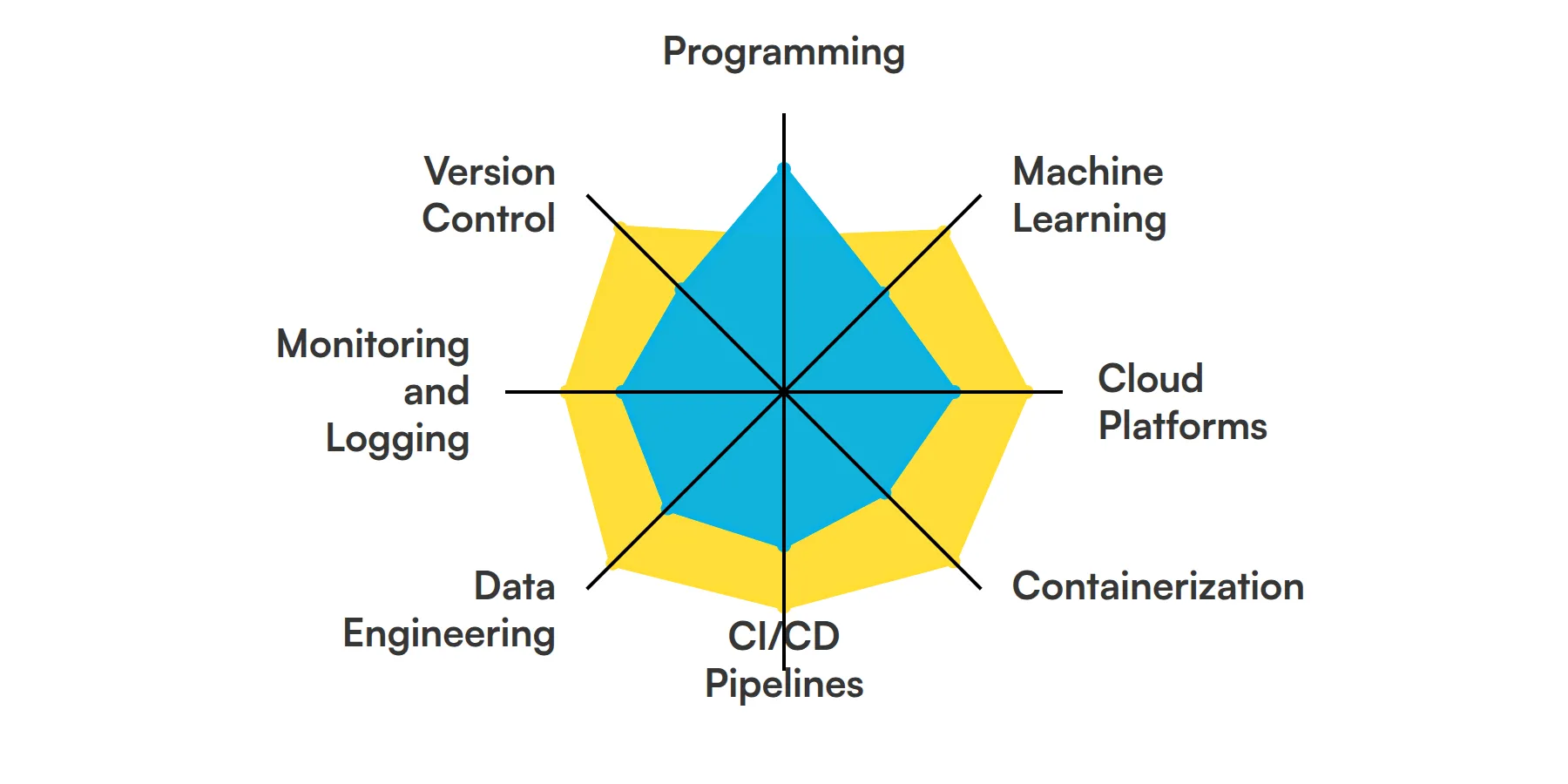
Programming
Programming is the backbone of any MLOps role. An MLOps engineer needs to be proficient in languages like Python and R to develop, deploy, and maintain machine learning models. These languages are crucial for writing scripts and automating tasks, which are key components of the MLOps workflow.
For more insights, check out our guide to writing a Programmer Job Description.
Machine Learning
Understanding machine learning algorithms and frameworks is crucial for an MLOps engineer. This knowledge allows them to collaborate effectively with data scientists and ensure that models are production-ready. Familiarity with libraries like TensorFlow and PyTorch is often required to optimize and deploy models efficiently.
Cloud Platforms
MLOps engineers often work with cloud platforms such as AWS, Azure, or Google Cloud. These platforms provide the infrastructure needed to deploy and scale machine learning models. Knowledge of cloud services helps in managing resources, setting up environments, and ensuring that models run smoothly in production.
Check out our guide for a comprehensive list of interview questions.
Containerization
Containerization tools like Docker are essential for packaging applications and their dependencies. An MLOps engineer uses these tools to ensure that machine learning models can be deployed consistently across different environments. This skill is crucial for maintaining the integrity and reproducibility of models.
CI/CD Pipelines
Continuous Integration and Continuous Deployment (CI/CD) pipelines are vital for automating the deployment of machine learning models. An MLOps engineer designs and manages these pipelines to streamline the process of integrating new code and deploying updates, ensuring that models are always up-to-date.
For more insights, check out our guide to writing a Devops Engineer Job Description.
Data Engineering
Data engineering skills are necessary for managing and processing large datasets. An MLOps engineer needs to understand data pipelines, ETL processes, and data storage solutions to ensure that models have access to clean and relevant data. This skill is key to maintaining the quality and performance of machine learning models.
Monitoring and Logging
Monitoring and logging are critical for tracking the performance of machine learning models in production. An MLOps engineer sets up monitoring tools to detect anomalies and ensure that models are functioning as expected. This skill helps in identifying issues early and maintaining the reliability of deployed models.
Check out our guide for a comprehensive list of interview questions.
Version Control
Version control systems like Git are used to manage changes in code and collaborate with team members. An MLOps engineer uses version control to track modifications in machine learning models and ensure that the latest versions are deployed. This skill is essential for maintaining a clear history of changes and facilitating teamwork.
7 secondary Machine Learning Operations (MLOps) Engineer skills and traits
The best skills for Machine Learning Operations (MLOps) Engineers include Model Optimization, Security Practices, APIs and Microservices, Infrastructure as Code, Collaboration Tools, Data Visualization and Networking.
Let’s dive into the details by examining the 7 secondary skills of a Machine Learning Operations (MLOps) Engineer.
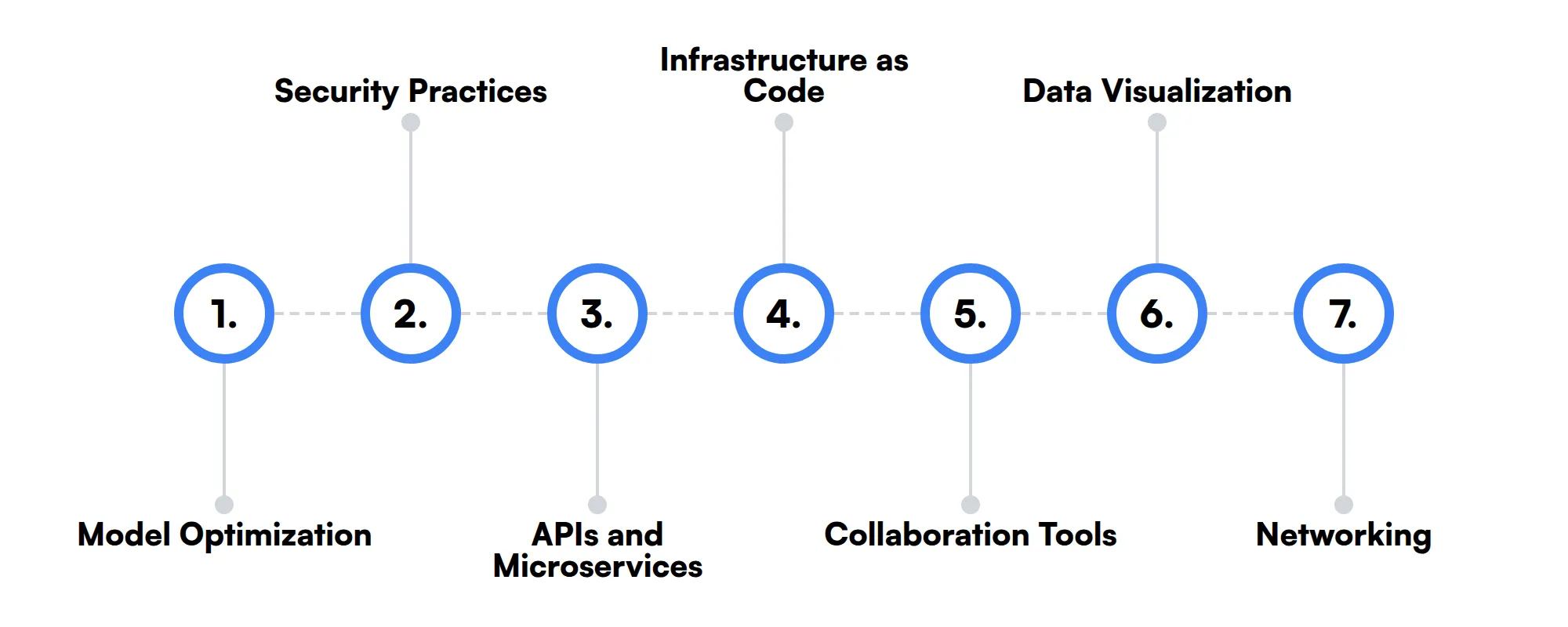
Model Optimization
Model optimization involves fine-tuning machine learning models to improve their performance. An MLOps engineer may work on optimizing models to reduce latency and increase accuracy, ensuring that they meet the desired performance criteria in production.
Security Practices
Security is a key concern in deploying machine learning models. An MLOps engineer needs to implement security best practices to protect data and models from unauthorized access. This includes setting up authentication, encryption, and monitoring for potential threats.
APIs and Microservices
Understanding APIs and microservices is important for integrating machine learning models into larger systems. An MLOps engineer uses these technologies to expose model functionalities and enable seamless communication between different components of an application.
Infrastructure as Code
Infrastructure as Code (IaC) tools like Terraform allow MLOps engineers to manage and provision infrastructure through code. This approach helps in automating the setup of environments and ensures consistency across deployments.
Collaboration Tools
Collaboration tools like JIRA and Confluence are used to manage projects and document processes. An MLOps engineer uses these tools to coordinate with team members, track progress, and maintain transparency in the development lifecycle.
Data Visualization
Data visualization skills help in presenting model results and insights to stakeholders. An MLOps engineer may use tools like Tableau or Matplotlib to create visualizations that communicate the performance and impact of machine learning models effectively.
Networking
Networking knowledge is important for setting up and managing the communication between different components of a machine learning system. An MLOps engineer needs to understand network configurations to ensure that data flows smoothly and securely between services.
How to assess Machine Learning Operations (MLOps) Engineer skills and traits
Assessing the skills and traits of a Machine Learning Operations (MLOps) Engineer can be a challenging task. With a diverse set of skills ranging from programming and machine learning to cloud platforms and containerization, it's important to have a comprehensive evaluation strategy. Resumes might highlight experience and education, but they often fall short in demonstrating a candidate's practical abilities and fit for your specific needs.
To truly understand a candidate's capabilities, skills-based assessments are invaluable. These assessments provide insights into their proficiency with CI/CD pipelines, data engineering, monitoring, logging, and version control. Adaface on-the-job skill tests offer a tailored approach to evaluating these competencies, leading to a 2x improved quality of hires and an 85% reduction in screening time. By focusing on real-world scenarios, these tests ensure that you find the right fit for your MLOps team.
Let’s look at how to assess Machine Learning Operations (MLOps) Engineer skills with these 6 talent assessments.
Basic Computer Skills Test
Our Basic Computer Skills Test evaluates a candidate's knowledge of fundamental computer skills, including data entry, Linux, Excel, computer programming aptitude, shell scripting, typing, system administration, and data analysis.
The test assesses their understanding of basic computer operations, data entry, and system administration. It also evaluates their ability to work with Excel and perform shell scripting.
Candidates who perform well demonstrate proficiency in using computer systems, managing data, and performing administrative tasks.
Machine Learning in AWS Online Test
The Machine Learning in AWS Online Test evaluates a candidate's knowledge and understanding of machine learning concepts and their application in the Amazon Web Services (AWS) environment.
This test covers machine learning techniques, data science, and data analysis. It also assesses the candidate's ability to leverage AWS services for implementing machine learning solutions.
High-scoring candidates show proficiency in using AWS for machine learning tasks and demonstrate a strong understanding of data science principles.
Cloud Computing Online Test
The Cloud Computing Online Test evaluates a candidate's knowledge and understanding of various aspects of cloud computing.
The test covers cloud service models, deployment models, and virtualization. It also assesses knowledge of cloud security, scalability, and cloud networking.
Candidates who excel in this test demonstrate a strong grasp of cloud infrastructure and the ability to manage and secure cloud environments.
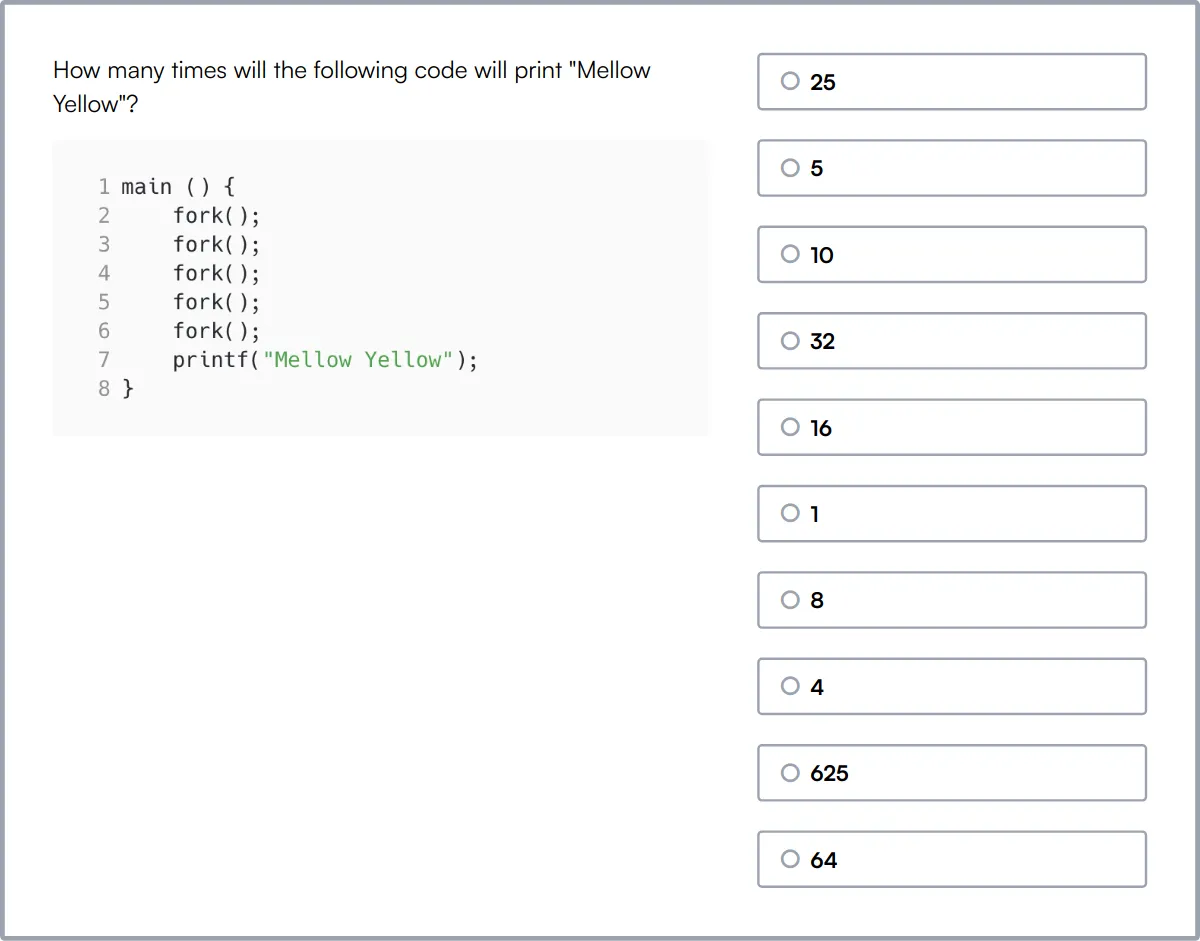
Docker Online Test
The Docker Online Test uses scenario-based MCQs to evaluate candidates on their proficiency in working with Docker containers.
This test assesses knowledge of Docker basics, Docker images, and Docker networking. It also evaluates the candidate's ability to use Docker Compose and manage Docker security.
Successful candidates demonstrate a strong understanding of Docker architecture and the ability to deploy and manage applications using Docker.
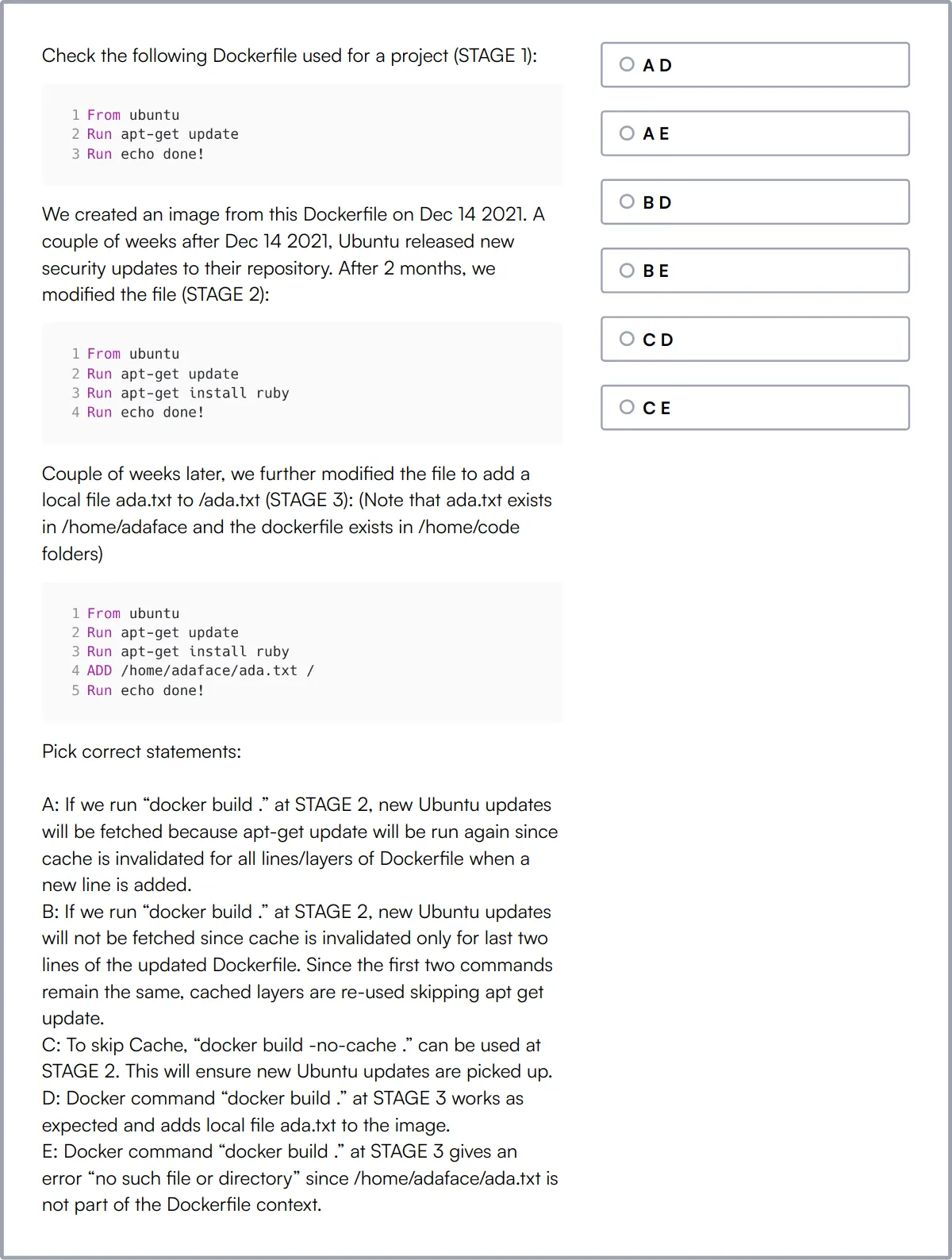
DevOps Test
The DevOps Test is a scenario-based online test designed to assess a candidate's proficiency in working with Linux, Git, Python, Docker, and DevOps skills.
The test covers Git basics, Docker containers, and Linux commands. It also evaluates the candidate's ability to perform shell scripting and work with Python fundamentals.
Candidates who perform well show proficiency in DevOps practices and the ability to integrate and automate processes using various tools.
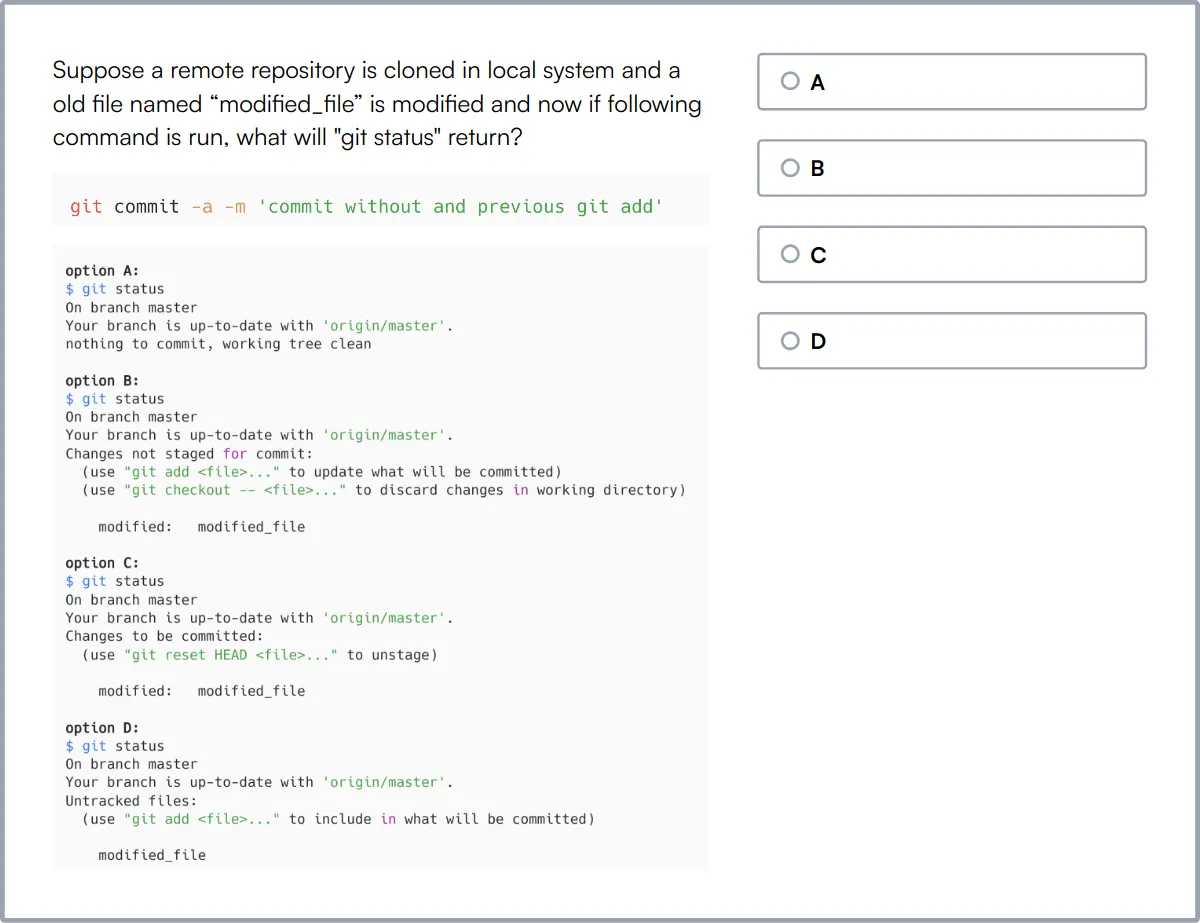
Data Engineer Test
The Data Engineer Test uses scenario-based multiple-choice questions to evaluate candidates on their expertise in data engineering.
This test assesses knowledge of data modeling, ETL processes, and database design. It also evaluates the candidate's ability to perform SQL queries and data analysis.
High-scoring candidates demonstrate proficiency in designing and maintaining data architectures and optimizing data systems for performance.

Summary: The 8 key Machine Learning Operations (MLOps) Engineer skills and how to test for them
| Machine Learning Operations (MLOps) Engineer skill | How to assess them |
|---|---|
| 1. Programming | Evaluate a candidate's proficiency in coding and algorithmic problem-solving. |
| 2. Machine Learning | Assess understanding and application of machine learning algorithms and principles. |
| 3. Cloud Platforms | Test knowledge of cloud services and management of cloud resources. |
| 4. Containerization | Check ability to package and deploy applications using containers. |
| 5. CI/CD Pipelines | Review experience in setting up and maintaining continuous integration/continuous deployment pipelines. |
| 6. Data Engineering | Examine skills in data collection, transformation, and pipeline construction. |
| 7. Monitoring and Logging | Verify capability to implement and manage system monitoring and logging. |
| 8. Version Control | Determine familiarity with version control systems and workflow management. |
MLOps Skills Test
Machine Learning Operations (MLOps) Engineer skills FAQs
What programming languages should an MLOps Engineer know?
An MLOps Engineer should be proficient in Python and familiar with languages like R, Java, or Scala. Python is widely used for machine learning and scripting tasks.
How can I assess a candidate's machine learning skills for an MLOps role?
Evaluate their understanding of ML algorithms, model training, and deployment. Ask about their experience with frameworks like TensorFlow or PyTorch.
Why is cloud platform knowledge important for MLOps Engineers?
Cloud platforms like AWS, Azure, and GCP offer scalable resources for deploying and managing ML models. Familiarity with these platforms is key for efficient operations.
What role does containerization play in MLOps?
Containerization, using tools like Docker, ensures consistent environments for ML models across development, testing, and production stages.
How do CI/CD pipelines benefit MLOps processes?
CI/CD pipelines automate the integration and deployment of ML models, reducing manual errors and speeding up the release cycle.
What is the importance of monitoring and logging in MLOps?
Monitoring and logging help track model performance and system health, enabling quick identification and resolution of issues.
How can version control be applied in MLOps?
Version control systems like Git manage code changes and track model versions, ensuring reproducibility and collaboration.
What security practices should an MLOps Engineer follow?
Implement data encryption, access controls, and regular security audits to protect ML models and data from unauthorized access.

40 min skill tests.
No trick questions.
Accurate shortlisting.
We make it easy for you to find the best candidates in your pipeline with a 40 min skills test.
Try for freeRelated posts
Free resources



